
Scientific Reports
Scope & Guideline
Unleashing Innovation Through Open Access Research.
Introduction
Aims and Scopes
- Multidisciplinary Research:
Scientific Reports publishes research across diverse scientific fields, promoting collaboration and knowledge sharing among disciplines. - Open Access:
The journal provides open access to all published articles, facilitating broad dissemination and accessibility of research findings. - Methodological Innovation:
It emphasizes innovative methodologies and techniques, encouraging the integration of computational and experimental approaches in research. - Data-Driven Research:
Scientific Reports showcases studies that rely on extensive data analysis, machine learning, and computational modeling to derive insights and conclusions. - Focus on Reproducibility:
The journal emphasizes the importance of reproducibility in research, encouraging authors to provide detailed methodologies and data for verification.
Trending and Emerging
- Machine Learning and AI Applications:
There is a growing trend in utilizing machine learning and artificial intelligence to solve complex problems, including disease prediction, environmental monitoring, and data analysis in various fields. - Sustainable Practices and Green Technologies:
Research focusing on sustainability, including eco-friendly materials, renewable energy solutions, and environmental impact assessments, is increasingly prominent. - Microbiome Studies:
The exploration of microbiomes in various contexts, including human health, agriculture, and environmental science, is on the rise, highlighting the interconnectedness of ecosystems. - Personalized Medicine:
There is an emerging interest in personalized and precision medicine, with research focusing on tailoring treatments based on individual genetic, environmental, and lifestyle factors. - Translational Research:
Studies that bridge the gap between laboratory research and clinical applications are becoming more prevalent, emphasizing the practical implications of scientific discoveries.
Declining or Waning
- Traditional Environmental Studies:
Research focused solely on traditional environmental studies, such as basic biodiversity assessments, appears to be declining in favor of more integrated approaches that combine ecological, technological, and socio-economic factors. - Basic Clinical Trials:
The focus on basic clinical trials without significant methodological innovation or interdisciplinary integration has waned, with more emphasis now placed on translational research and real-world applications. - Single-Domain Studies:
There is a noticeable decrease in studies that focus on a singular domain or narrowly defined research questions, as the journal encourages broader, multidisciplinary investigations. - Conventional Laboratory Techniques:
The prevalence of publications employing conventional laboratory methods without incorporating advanced analytical techniques or computational models has diminished.
Similar Journals
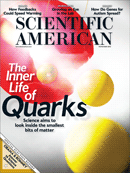
SCIENTIFIC AMERICAN
Advancing Scientific Discourse for AllSCIENTIFIC AMERICAN, published by Springer, stands as a prestigious multidisciplinary journal dedicated to disseminating cutting-edge scientific knowledge across a range of fields. Established in 1947, this journal has been integral in bridging the gap between scientific research and public understanding, making complex ideas accessible to a broader audience. With an ISSN of 0036-8733 and E-ISSN of 1946-7087, it maintains a strong standing within the academic community, currently ranked in the Q3 category for its multidisciplinarity, and is positioned at #93 out of 120 in its Scopus ranking, reflecting its valuable contribution to scientific discourse. While the journal is not open access, its long history and commitment to knowledge sharing ensure it remains a vital resource for researchers, professionals, and students alike, fostering a deeper appreciation of science in society.

Cultura Cientifica
To Illuminate the Path of Scientific Discovery.Cultura Cientifica is a distinguished open-access journal published by FUNDACION UNIV JUAN CASTELLANOS, dedicated to fostering scientific knowledge and community engagement within the field of science and technology. With an ISSN of 1657-463X and an E-ISSN of 2389-9638, the journal has been providing unrestricted access to research since its inception in 2001, effectively contributing to the dissemination of valuable scientific insights. Based in Tunja, Boyacá, Colombia, "Cultura Cientifica" aims to serve as a platform for researchers, professionals, and students by featuring high-quality research articles, reviews, and case studies that reflect the latest advancements and debates in the scientific community. Although the journal does not currently have an H-index or Scopus ranking, its commitment to open access and knowledge sharing makes it an essential resource for those seeking to expand their understanding and impact within the scientific discourse.

iScience
Leading the way in interdisciplinary scientific inquiry.iScience, published by Cell Press, is a premier open-access journal committed to advancing the field of multidisciplinary sciences. Since its inception in 2018, iScience has established itself as a leader in the academic community, with an impressive Scopus ranking of #17 out of 171 in its category, placing it in the 90th percentile. The journal aims to foster interdisciplinary collaboration by disseminating high-quality research across diverse scientific domains, thereby providing a platform for innovative approaches to complex challenges. iScience is dedicated to open access, ensuring that research findings are readily available to a global audience, enhancing visibility and accessibility for scholars, professionals, and students alike. With its ongoing commitment to excellence and impact, iScience plays a crucial role in shaping the future of scientific inquiry.

MethodsX
Bridging disciplines through cutting-edge research techniques.MethodsX is a premier peer-reviewed journal published by Elsevier, dedicated to advancing the field of applied methods across various disciplines, particularly in Clinical Biochemistry and Medical Laboratory Technology. Since its inception in 2014, this Open Access journal has fostered innovation by allowing researchers to share and access high-quality methodologies designed to enhance reproducibility and effectiveness in research practices. Based in the Netherlands, MethodsX has achieved an impressive ranking in the Scopus database, placing in the top 78th percentile among multidisciplinary journals. The journal is committed to providing researchers, professionals, and students with a platform to disseminate new techniques and strategies, ensuring that groundbreaking methods are readily available to the global scientific community. With a focus on fostering collaboration and interdisciplinary research, MethodsX aims to bridge gaps across various scientific domains and empower future advancements until its converged years in 2024.

Heliyon
Fostering global engagement with groundbreaking scientific insights.Heliyon is a distinguished open access journal published by CELL PRESS, headquartered in the Netherlands, that has been advancing the dissemination of scientific knowledge since 2015. With its innovative multidisciplinary approach, Heliyon has garnered significant recognition in the academic community, maintaining a prominent position as evidenced by its Q1 ranking in the multidisciplinary category for 2023, placing it at the forefront of its field. It boasts an impressive Scopus rank of #31 out of 171 journals, ranking in the 82nd percentile, underscoring its influence and reach among scholars and practitioners alike. Committed to providing a platform for diverse research, Heliyon not only facilitates the publication of high-quality research but also ensures that it is broadly accessible, enhancing visibility and engagement from a global audience. This journal is an invaluable resource for researchers, professionals, and students dedicated to interdisciplinary collaboration and innovation.

Earth System Science Data
Pioneering Open Access for Earth and Planetary ResearchEarth System Science Data, published by COPERNICUS GESELLSCHAFT MBH, is a premier open access journal dedicated to advancing the field of Earth and planetary sciences. With an impressive impact factor, it holds a distinguished Q1 ranking in the Earth and Planetary Sciences category, underscoring its significance within the scientific community. Established in 2009, the journal has been committed to providing a platform for the dissemination of high-quality, freely accessible research data that supports the understanding and management of Earth's complex systems. The journal welcomes contributions that offer extensive datasets, innovative methodologies, and collaborations that push the frontiers of Earth sciences, making it an essential resource for researchers, professionals, and students alike. Based in Göttingen, Germany, Earth System Science Data remains a vital asset for those seeking to engage with and contribute to impactful scientific discourse across the globe.
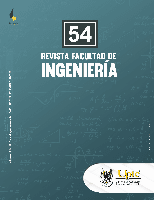
Revista Facultad de Ingenieria, Universidad Pedagogica y Tecnologica de Colombia
Innovating Solutions, Connecting CommunitiesRevista Facultad de Ingenieria, published by the Universidad Pedagógica y Tecnológica de Colombia, is a cornerstone journal in the field of engineering, aiming to foster the dissemination of innovative research and advancements in engineering practices. With an ISSN of 0121-1129 and an E-ISSN of 2357-5328, this journal has embraced the Open Access model since 2006, making valuable insights and groundbreaking studies readily accessible to researchers, professionals, and students alike. Situated in Tunja, Boyacá, Colombia, the journal not only supports local academic communities but also contributes to the global dialogue in engineering and technology. Its commitment to quality research, underpinned by a rigorous peer-review process, enhances its reputation as a vital source for contemporary studies and applications in engineering disciplines. By publishing diverse contributions, the journal encourages multidisciplinary collaboration and knowledge exchange, further solidifying its importance in the academic arena.
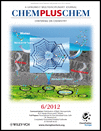
ChemPlusChem
Empowering Scientists with Open Access to Cutting-Edge ResearchChemPlusChem is a premier journal published by WILEY-V C H VERLAG GMBH, dedicated to the vibrant field of chemistry. With an ISSN of 2192-6506 and an impressive Q1 ranking in Scopus's 2023 category for miscellaneous chemistry, this journal serves as a significant platform for the dissemination of high-quality research and innovative findings. Since its inception in 2012, ChemPlusChem has fostered interdisciplinary collaborations, encapsulating a wide array of topics within chemistry that facilitate scientific advancement and education. The journal features a robust open access system, enabling extensive visibility for authors while providing easy-to-access resources for researchers, professionals, and students globally. Located in Weinheim, Germany, ChemPlusChem reflects international standards and ambitions, striving to enrich the global scientific community through rigorous research and engaging scientific discourse.
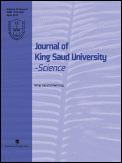
JOURNAL OF KING SAUD UNIVERSITY SCIENCE
Empowering Scientific Innovation Through Open AccessJOURNAL OF KING SAUD UNIVERSITY SCIENCE, published by Elsevier, stands as a key resource in the field of multidisciplinary research, featuring a notable Impact Factor evident from its 2023 Q1 categorization and impressive Scopus rank of #16 out of 171, placing it in the top 10% of its category. Since its transition to Open Access in 2009, this journal has fostered greater accessibility to pioneering research outcomes and innovative methodologies, enhancing knowledge dissemination globally. With an established history dating back to 1994 and an ongoing commitment to advancing scientific exploration until 2024, it serves as a vital platform for researchers, professionals, and students alike. This journal aims to publish high-quality articles that bridge various scientific disciplines, thereby encouraging collaboration and innovation. With its base in the Netherlands, JOURNAL OF KING SAUD UNIVERSITY SCIENCE not only reflects the academic rigor of its publisher but also engages a diverse international readership, making it an indispensable tool for the modern scientist.
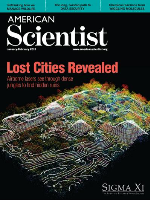
AMERICAN SCIENTIST
Cultivating Curiosity Through Accessible Science.AMERICAN SCIENTIST is a prestigious multidisciplinary journal published by SIGMA XI-SCI RES SOC, renowned for its commitment to disseminating high-quality scientific research and insights since its inception in 1946. With an ISSN of 0003-0996 and an E-ISSN of 1545-2786, this journal serves as a valuable resource for researchers, professionals, and students alike, seeking to engage with current scientific discussions across various disciplines. Though it is not an Open Access journal, its articles are well-regarded in the academic community, evidenced by its Scopus ranking, placing it in the top 80th percentile among 88 multidisciplinary journals. Covering a wide range of topics, AMERICAN SCIENTIST aims to bridge the gap between science and the public by providing accessible writing that encourages informed dialogue around scientific advancement. With its extensive historical range from 1946 to 2016, it continues to be a critical platform for the exchange of innovative ideas and research findings that shape the future of science.